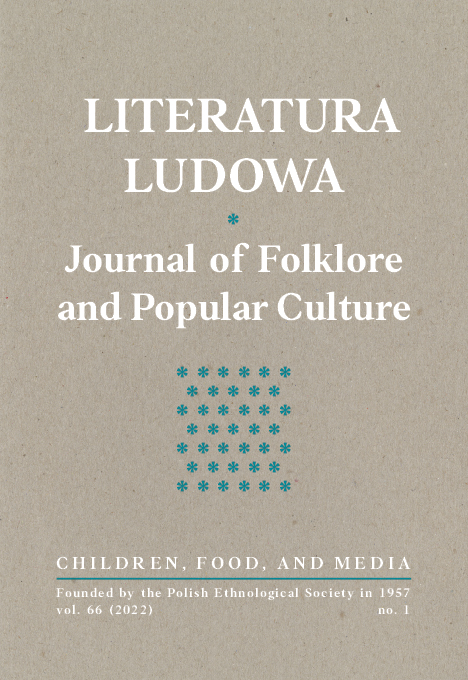Unity and food in Pan Kuleczka stories’ series by Wojciech Widłak
DOI:
https://doi.org/10.12775/LL.1.2022.005Keywords
children’s literature, Pan Kuleczka, Wojciech Widłak, food studies, Jonathan HaidtAbstract
In the present article I would like to analyse the way in which the family and their meals (what they eat and how they eat) are pictured in Pan Kuleczka stories’ series by Wojciech Widłak. Both eating and the variety of dishes have nowadays become a sort of supermetaphor, which involves different spheres of human activity. In a realistic convention chosen by Widłak, food is a part of everyday adventures of the story protagonists; it is their pleasure, an innocent weakness, a kind of consolation, a great metaphor of love in the family, always expressing an experience of the balance in family life. In my interpretation of the stories I will use concepts of eros and agape and apply basic terms of Jonathan Haidt’s theory of moral psychology.
References
b.a. (1963). A Sourcebook of Chinese Philosophy (przeł. W.-T. Chan). Princeton, New Jersey: Princeton University Press.
Benedykt XVI (2005, 25 grudnia). Deus caritas est [Encyklika papieża Benedykta XVI]. Pobrano z: https://www.vatican.va/content/benedict-xvi/pl/encyclicals/documents/hf_ben-xvi_enc_20051225_deus-caritas-est.html
Brükner, A. (1957). Słownik etymologiczny języka polskiego. Warszawa: Wiedza Powszechna.
Deleuze, G. (2000). Empiryzm i subiektywność. Esej o naturze ludzkiej według Hume’a (przeł. K. Jarosz). Warszawa: Wydawnictwo KR.
Haidt, J. (2014). Prawy umysł (przeł. A. Nowak-Młynikowska). Sopot: Smak Słowa.
Hume, D. (2005a). Badania dotyczące zasad moralności (przeł. M. Filipczuk, T. Teszner). Kraków: Zielona Sowa.
Hume, D. (2005b). Traktat o naturze ludzkiej (przeł. Cz. Znamierowski). Warszawa: Aletheia.
Lacoff, G., Johnson, M. (1988). Metafory w naszym życiu (przeł. T. P. Krzeszówski). Warszawa: PIW.
Menninghaus, W. (2009). Wstręt. Teoria i historia (przeł. G. Sowiński). Kraków: Universitas.
Piechowiak, M. (2016). Między Erosem i Agape. Bydgoszcz: Oficyna Wydawnicza Epigram.
Platon (2012). Uczta (przeł. A. Serafin). Warszawa: Sic!
Ricoeur, P. (1989). Metafora i symbol. W: P. Rioceur, Język, tekst, interpretacja. Wybór pism (przeł. K. Rosner, P. Graff; s. 123–155). Warszawa: PIW.
Rozin, P., Haidt, J., Fincher, K. (2009). From oral to moral. Science, 323, 1179–1180. https://www.science.org/doi/10.1126/science.1170492
Shwreder, R. A. (1991). Thinking through cultures: Expeditions in cultural psychology. Cambridge: Harvard University Press.
Shwreder, R. A., Much N. C., Mahapatra, M., Park, L. (1997). The „big three” of morality (autonomy, community, and divinity), and the „big three” explanations of suffering. W: A. Brandt, P. Rozin (eds.), Morality and health (s. 119–169). New York: Routldge.
Sobiechowska-Szuchta, K. (2018, 30 maja). Autor Pana Kuleczki: Naprawdę bym chciał, żeby to, co robię jakoś pomagało [wywiad z Wojciechem Widłakiem na portalu RMF24]. Pobrano z: https://www.rmf24.pl/raporty/raport-audiobook-pan-kuleczka/fakty/news-autor-pana-kuleczki-naprawde-bym-chcial-zeby-to-co-robie-jak,nId,2587787#crp_state=1
Widłak, W. (2002). Pan Kuleczka. Poznań: Media Rodzina.
Widłak, W. (2003). Pan Kuleczka. Skrzydła. Poznań: Media Rodzina.
Widłak, W. (2004). Pan Kuleczka. Spotkanie. Poznań: Media Rodzina.
Widłak, W. (2006). Pan Kuleczka. Światło. Poznań: Media Rodzina.
Widłak, W. (2008). Pan Kuleczka. Dom. Poznań: Media Rodzina.
Widłak, W. (2012). Pan Kuleczka. Radość. Poznań: Media Rodzina.
Widłak, W. (2016). Pan Kuleczka. Marzenia. Poznań: Media Rodzina.
Widłak, W. (2018). Pan Kuleczka. Skarby. Poznań: Media Rodzina.
Zajonc, R. (1985). Uczucia a myślenie. Nie trzeba się domyślać, by wiedzieć, co się woli. Przegląd Psychologiczny, 1, 27–72.
Downloads
Published
How to Cite
Issue
Section
License

This work is licensed under a Creative Commons Attribution-NoDerivatives 4.0 International License.
1. The authors give the publisher (Polish Ethnological Society) non-exclusive license to use the work in the following fields:a) recording of a Work / subject of a related copyright;
b) reproduction (multiplication) Work / subject of a related copyright in print and digital technique (ebook, audiobook);
c) marketing of units of reproduced Work / subject of a related copyright;
d) introduction of Work / object of related copyright to computer memory;
e) dissemination of the work in an electronic version in the formula of open access under the Creative Commons license (CC BY - ND 3.0).
2. The authors give the publisher the license free of charge.
3. The use of the work by publisher in the above mentioned aspects is not limited in time, quantitatively nor territorially.
Stats
Number of views and downloads: 518
Number of citations: 0



